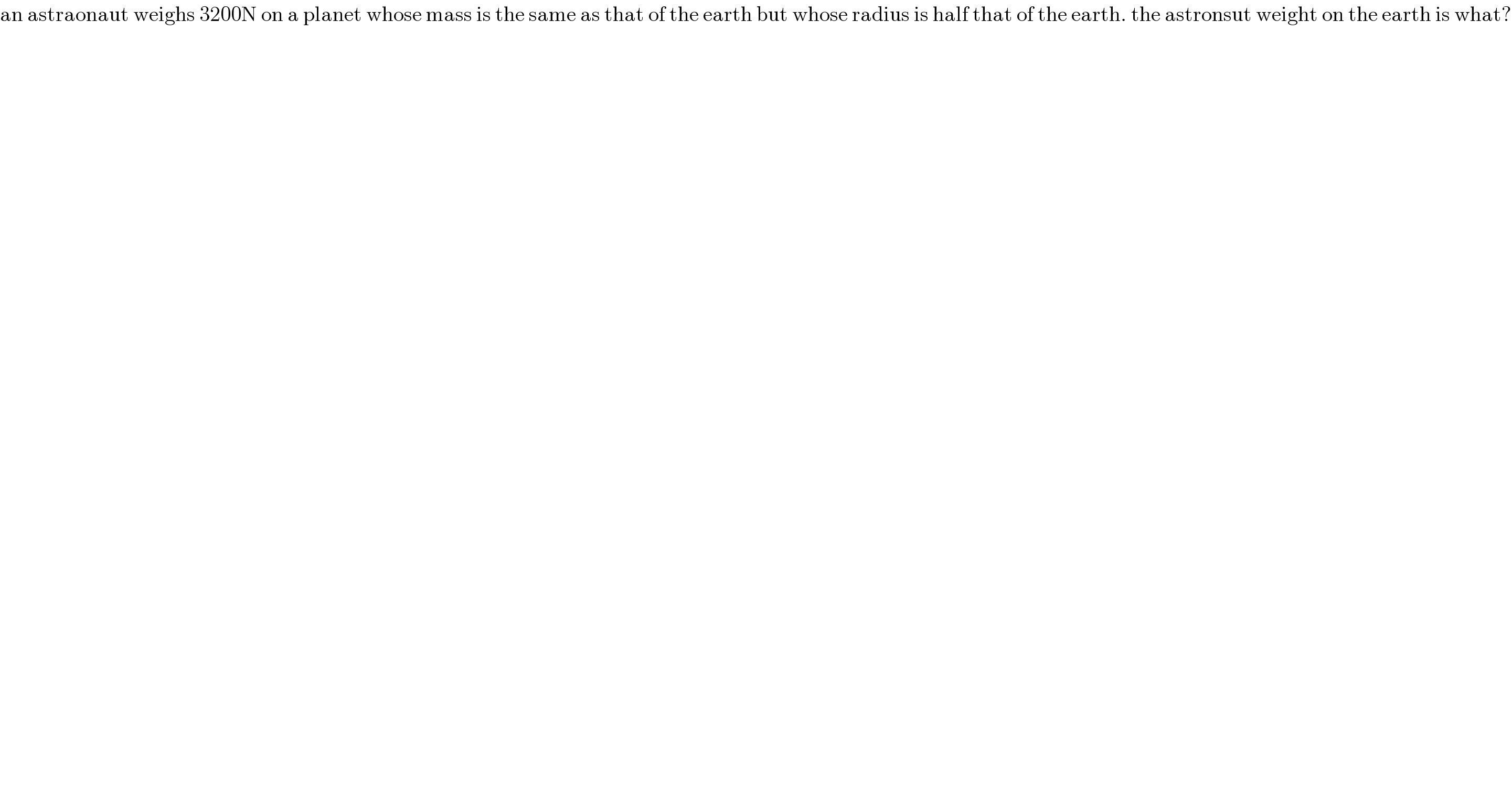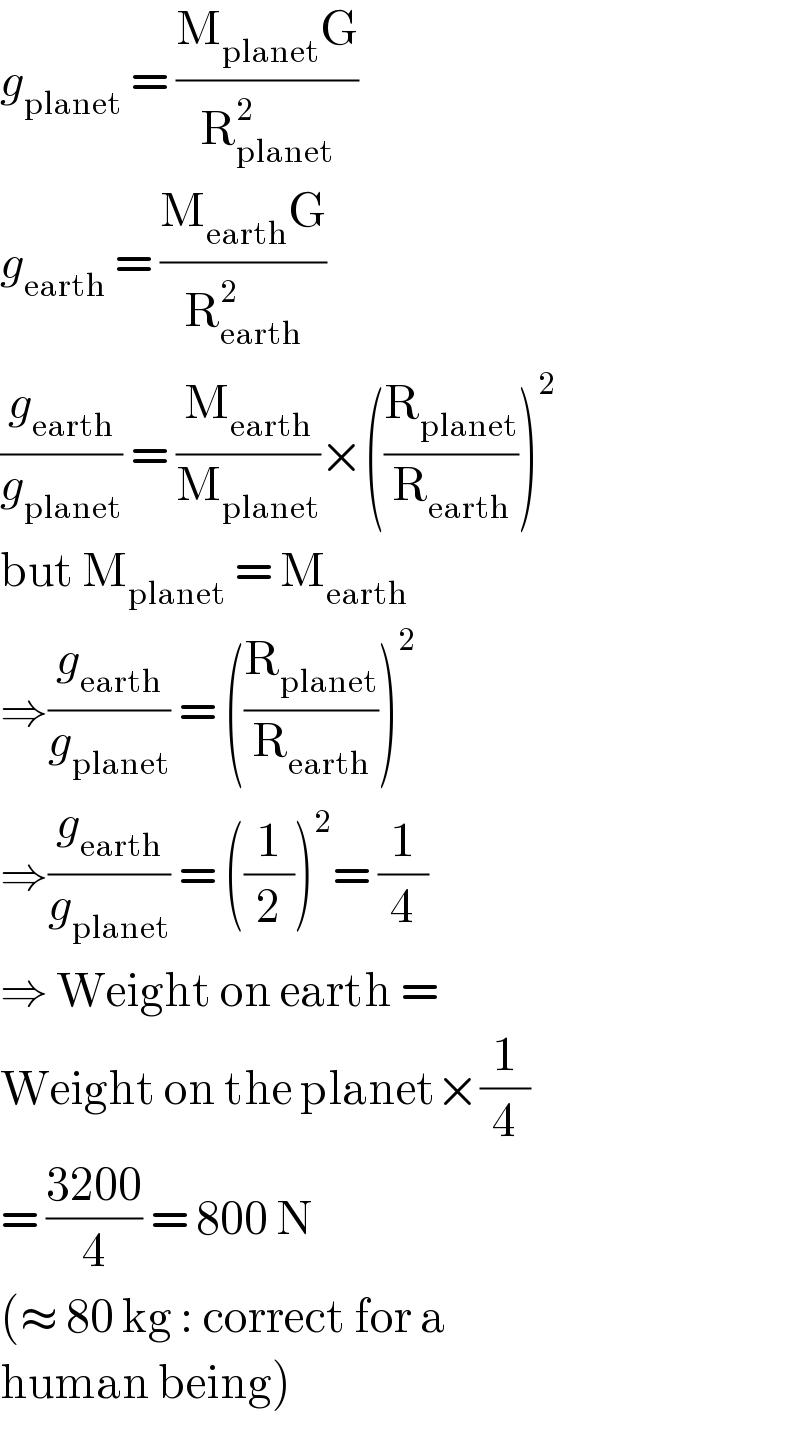Question Number 104299 by aurpeyz last updated on 20/Jul/20

$$\mathrm{an}\:\mathrm{astraonaut}\:\mathrm{weighs}\:\mathrm{3200N}\:\mathrm{on}\:\mathrm{a}\:\mathrm{planet}\:\mathrm{whose}\:\mathrm{mass}\:\mathrm{is}\:\mathrm{the}\:\mathrm{same}\:\mathrm{as}\:\mathrm{that}\:\mathrm{of}\:\mathrm{the}\:\mathrm{earth}\:\mathrm{but}\:\mathrm{whose}\:\mathrm{radius}\:\mathrm{is}\:\mathrm{half}\:\mathrm{that}\:\mathrm{of}\:\mathrm{the}\:\mathrm{earth}.\:\mathrm{the}\:\mathrm{astronsut}\:\mathrm{weight}\:\mathrm{on}\:\mathrm{the}\:\mathrm{earth}\:\mathrm{is}\:\mathrm{what}? \\ $$
Answered by OlafThorendsen last updated on 20/Jul/20

$${g}_{\mathrm{planet}} \:=\:\frac{\mathrm{M}_{\mathrm{planet}} \mathrm{G}}{\mathrm{R}_{\mathrm{planet}} ^{\mathrm{2}} } \\ $$$${g}_{\mathrm{earth}} \:=\:\frac{\mathrm{M}_{\mathrm{earth}} \mathrm{G}}{\mathrm{R}_{\mathrm{earth}} ^{\mathrm{2}} } \\ $$$$\frac{{g}_{\mathrm{earth}} }{{g}_{\mathrm{planet}} }\:=\:\frac{\mathrm{M}_{\mathrm{earth}} }{\mathrm{M}_{\mathrm{planet}} }×\left(\frac{\mathrm{R}_{\mathrm{planet}} }{\mathrm{R}_{\mathrm{earth}} }\right)^{\mathrm{2}} \\ $$$$\mathrm{but}\:\mathrm{M}_{\mathrm{planet}} \:=\:\mathrm{M}_{\mathrm{earth}} \\ $$$$\Rightarrow\frac{{g}_{\mathrm{earth}} }{{g}_{\mathrm{planet}} }\:=\:\left(\frac{\mathrm{R}_{\mathrm{planet}} }{\mathrm{R}_{\mathrm{earth}} }\right)^{\mathrm{2}} \\ $$$$\Rightarrow\frac{{g}_{\mathrm{earth}} }{{g}_{\mathrm{planet}} }\:=\:\left(\frac{\mathrm{1}}{\mathrm{2}}\right)^{\mathrm{2}} =\:\frac{\mathrm{1}}{\mathrm{4}} \\ $$$$\Rightarrow\:\mathrm{Weight}\:\mathrm{on}\:\mathrm{earth}\:= \\ $$$$\mathrm{Weight}\:\mathrm{on}\:\mathrm{the}\:\mathrm{planet}×\frac{\mathrm{1}}{\mathrm{4}} \\ $$$$=\:\frac{\mathrm{3200}}{\mathrm{4}}\:=\:\mathrm{800}\:\mathrm{N} \\ $$$$\left(\approx\:\mathrm{80}\:\mathrm{kg}\::\:\mathrm{correct}\:\mathrm{for}\:\mathrm{a}\right. \\ $$$$\left.\mathrm{human}\:\mathrm{being}\right) \\ $$
Answered by Dwaipayan Shikari last updated on 20/Jul/20

$$\frac{\mathrm{g}}{\mathrm{g}'}=\frac{\left(\mathrm{R}+\mathrm{H}\right)^{\mathrm{2}} }{\mathrm{R}^{\mathrm{2}} } \\ $$$$\frac{\mathrm{mg}}{\mathrm{mg}'}=\frac{\left(\frac{\mathrm{R}}{\mathrm{2}}\right)^{\mathrm{2}} }{\mathrm{R}^{\mathrm{2}} } \\ $$$$\frac{\mathrm{mg}}{\mathrm{mg}'}=\frac{\mathrm{1}}{\mathrm{4}} \\ $$$$\frac{\mathrm{mg}}{\mathrm{3200}}=\frac{\mathrm{1}}{\mathrm{4}} \\ $$$$\mathrm{mg}=\mathrm{800}\:\mathrm{N} \\ $$$$ \\ $$
